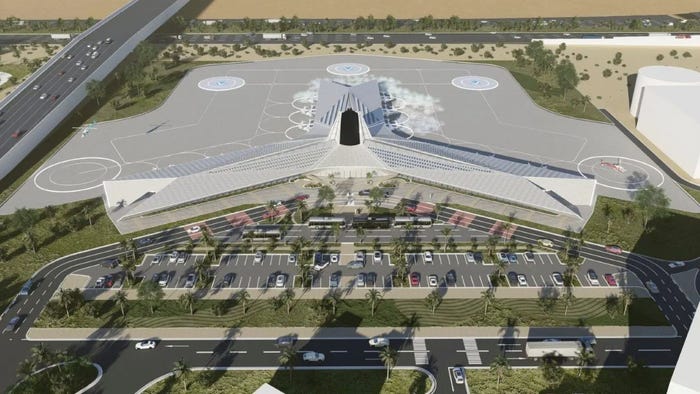Flying Taxi Company Gets $169M for Production FacilityFlying Taxi Company Gets $169M for Production Facility
Beta Technologies recently opened a manufacturing facility in Vermont for the large-scale production of its flying vehicles

An air taxi developer has been approved for a $169 million loan to finance its net-zero final assembly production facility.
Beta Technologies in Burlington, Vermont, was approved for the loan from the Export-Import Bank of the United States (EXIM).
This is part of EXIM’s Make More in America initiative, estimated to support 400 clean energy jobs in Vermont.
“We are excited to partner with the Export-Import Bank of the United States as part of its new Make More in America initiative,” said Kyle Clark, Beta founder and CEO.
Beta recently opened its manufacturing facility in Vermont for the large-scale production of its electric aircraft.
The 188,500-square-foot facility is located at the Patrick Leahy Burlington International Airport, where Beta plans to build its eVTOL (electric vertical takeoff and landing) and CTOL (conventional takeoff and landing) aircraft.
Beta’s Alia vertical and conventional takeoff vehicles are targeted for military and commercial use, including for medical, defense and passenger industries.
Beta has been working on developing its electric air vehicles with numerous aerospace suppliers including Albany Engineered Composites, Advanced Integration Technology, Garmin, Sensata Technologies, Volz Servos and Solvay.
The new production facility, on a 40-acre site at the airport, could ultimately produce 300 electric aerial vehicles (EAV) a year, according to the company.
The company also has locations in Plattsburgh, New York, Washington, D.C., Montreal, Canada, Raleigh, North Carolina, and Springfield, Ohio.
Beta said it has flown more than 500 piloted flights of its battery-powered aircraft.
Beta recently landed its piloted EAV at Duke Field, a part of Eglin Air Force Base after a series of flights starting in Burlington, Vermont.
The Beta Alia vehicle is scheduled to stay at Elgin for several months for the Air Force for hands-on experimentation and training with the technology.
Beta has partnered with AFWERX, the innovation arm of the U.S. Air Force that leverages the Air Force Research Laboratory for this program.
On its way to Florida, Beta’s EAV landed at Joint Base Andrews, the home of Air Force One.
The EAV maker also flew one of its vehicles from New York to Montreal, crossing international borders.
That test flight, with a pilot and flight test engineer on board, was in the battery-powered Alia CTOL.
Beta also recently installed aircraft electric charging stations at Eglin Air Force Base to service the electric flying vehicles there.
Beta’s eCTOL aircraft is planned for service in 2025 with its vertical version in service the following year.
Many EAVs are eVTOLs, which do not require traditional runways, since they take off and land straight up and down.
Vertiport facilities to manage the takeoff, landing, charging and maintenance of such vehicles are being established by companies including Volatus Infrastructure and Aeroauto Vertiport Development, which has retail showrooms for flying vehicle sales in Florida.
A Department of Defense (DoD) research center partnered with Beta starting in 2020 to develop electric aviation in the U.S. military market. Beta received an airworthiness certificate for manned flight from the military, with military test pilots flying the vehicles.
The Beta electric charger can charge an electric aircraft in less than an hour, according to the company.
Numerous other electric flying vehicle companies are interacting with the U.S. military, which continues to show keen interest in electric flying vehicles with various capabilities.
Countless EAVs are under development, ranging from those in the ultralight category, which do not require a pilot license, to air taxis. Major airlines including Delta Air Lines, United Airlines and American Airlines all have placed orders or pre-orders for electric aerial vehicles.
Like what you've read? For more stories like this on flying cars and other emerging technologies, sign up for our free daily email newsletter to stay updated!
Read more about:
Flying CarsAbout the Author
You May Also Like






